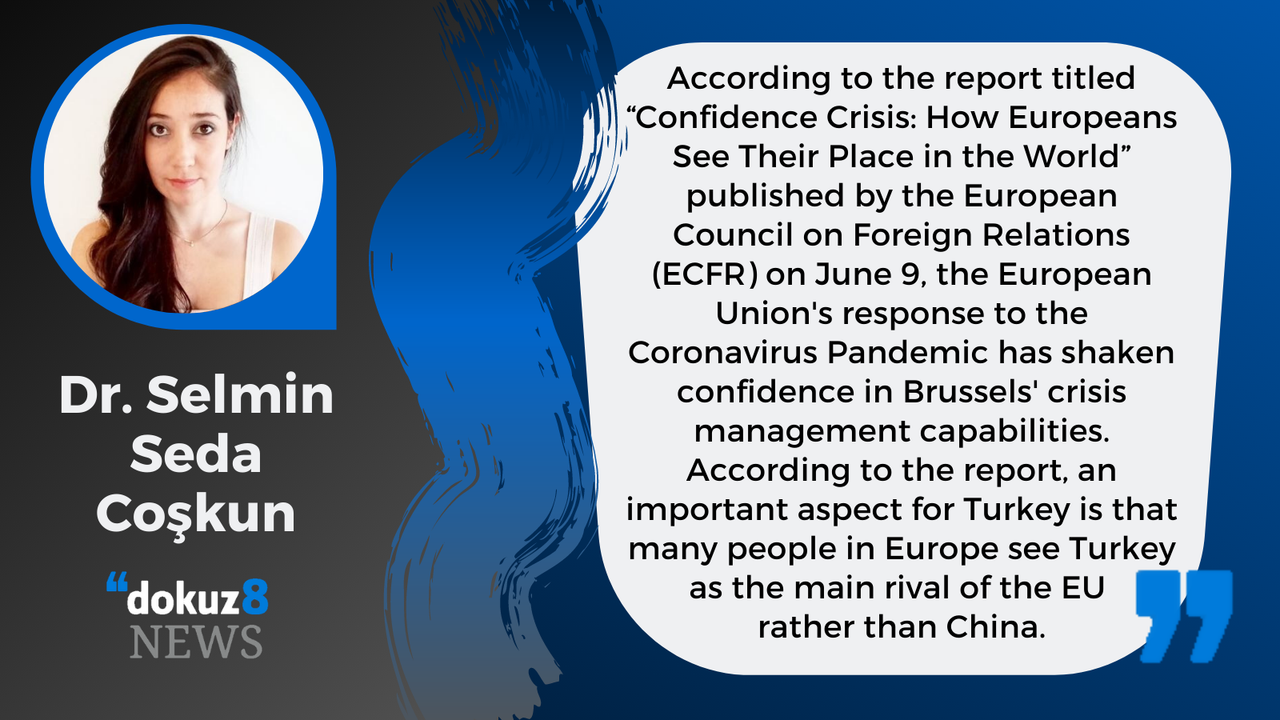According to the report titled “Confidence Crisis: How Europeans See Their Place in the World” published by the European Council on Foreign Relations (ECFR) on June 9, the European Union's response to the Coronavirus Pandemic has shaken confidence in Brussels' crisis management capabilities. According to the report, an important aspect for Turkey is that many people in Europe see Turkey as the main rival of the EU rather than China.
In half of the Member States surveyed, the majority of respondents said they had little or no confidence in the EU, or that their confidence had been broken after last year's events. Majorities in France (62%), Germany (55%), Italy (57%), Spain (52%) and Austria (51%) now believe that the European project is “broken”. This view is particularly evident in France, because the belief that the EU is corrupt seems to be most firmly entrenched in France. Yet, despite the lack of public confidence, the belief that more cooperation is needed among EU countries remains widespread. In all countries surveyed, with the exception of France and Germany, most respondents indicate that the coronavirus crisis has brought about the need for greater cooperation among member states. In France, only 45% of respondents believe that more cooperation is needed within the EU. This rate is the lowest of all the countries surveyed! As a matter of fact, these findings, which form the basis of the report, also constitute the main point of the important discussions at the G7, NATO and EU summits.
WHAT SHOULD EUROPE CHANGE?
When asked what Europe needed to change after the Covid-19 pandemic, the most common response was the need to be able to develop a collective response to global crises. The ECFR survey also revealed a positive view on maintaining EU membership. In other words, the EU continues to have strong support in every country, and many are keen on further cooperation to make the EU a global player. 11 out of 12 Member States surveyed consider EU membership to be 'good for their country’. The exception to this is again France, where the most common response (29%) is that membership is "neither a good nor a bad thing".
ATTITUDES TOWARDS OTHER GLOBAL ACTORS
Regarding attitudes towards other global players, the ECFR also reveals that it has found that Europeans now see a world of strategic partners rather than natural alliances. All other global players, including China and Russia, are seen somehow as strategic partners. However, Europeans remain cautious about China, favoring a stronger response from the EU to violations of international law. In addition, more than 40% of respondents in Germany, Denmark, Austria and France see China as a “competitor". Interestingly, only 17% of those surveyed by the ECFR consider Russia an “enemy". This figure drops to 5-7% among Bulgarians, Italians and Portuguese.
RESULTS FOR TURKEY
According to the report, many people in Europe see Turkey, rather than China, as the EU's main competitor. The majority of respondents in France (53%), Germany (52%), Denmark (42%) and Sweden (40%) see Turkey as a “competitor” or “enemy” of the EU. Many Europeans want the EU to criticize Turkey when it violates human rights, the rule of law or democratic values. Regarding violations in Turkey, respondents in the Netherlands (69%), Austria (66%), Germany (63%), Denmark (63%) and Sweden (61%) were more likely to say they wanted a firmer stance from leaders. Criticism against Turkey in France is at the rate of 57%. This is much more than France's response to China (45%).
LESSONS FOR THE EUROPE FROM THE RESULTS
In short, the ECFR report, based on surveys, reveals that confidence in the EU has collapsed during the Covid-19 pandemic and that in countries like Germany, France, Spain and Italy the majority of citizens now think the European project is broken. According to the report's authors, Susi Dennison and Jana Puglierin, the results of this survey, which focused on citizens' attitudes a year after the start of the Covid-19 pandemic, should serve as a wake-up call to authorities in Brussels. They say it might face new questions about the purpose and legitimacy of the EU unless immediate action is taken to end Brussels' impression of its widespread ineffectiveness among Europeans, particularly among the bloc's founding members. The report authors also urge EU leaders to demonstrate leadership at this month's G7, NATO and EU-US summits. They warn that confidence in the already undermined need for European cooperation will not hold up in the event of further failures. The results can also be seen as an indicator to determine how the countries can reshape their relationship with Europe ahead of the parliamentary elections. But, as it is figured out, the most striking country of the results is France. It seems that the discussions will heat up whether there will be a 'Frexit' in the coming days. On the other hand, as long as Turkey continues to neglect the issue of human rights, it will have nothing to expect from Europe in the forthcoming days.

